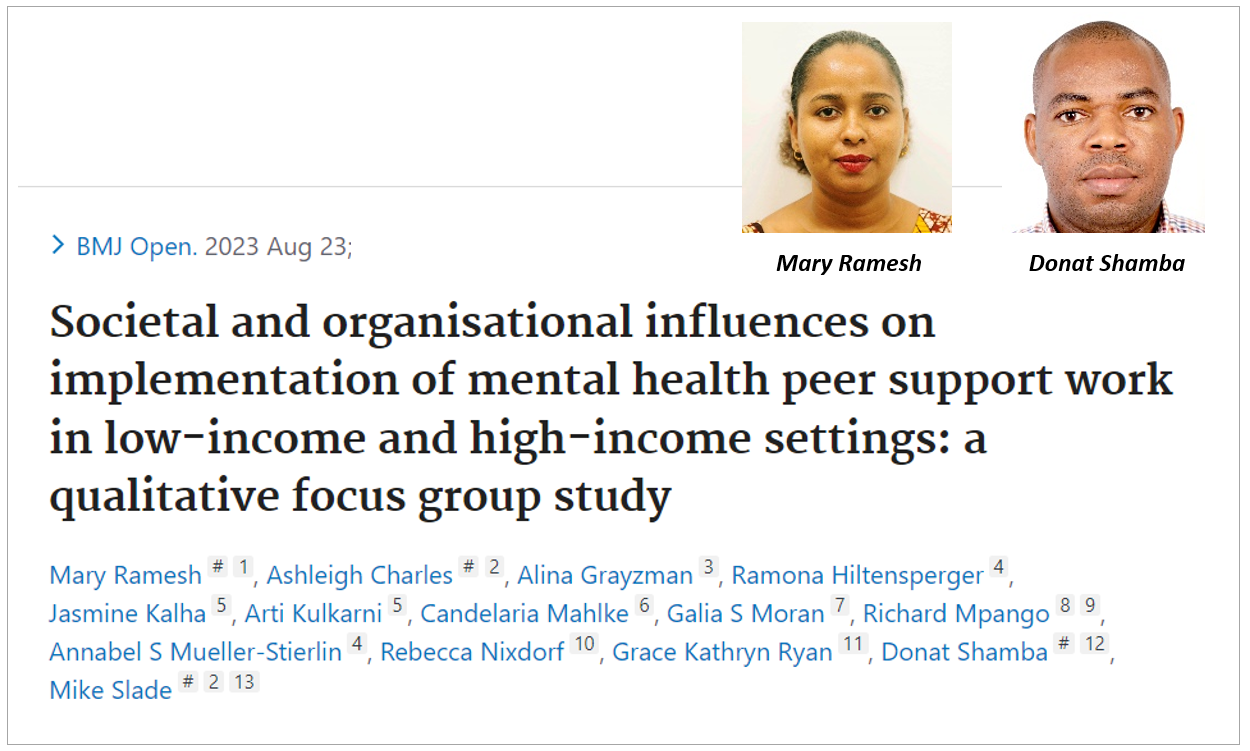
MENTAL HEALTH: Scientists want peer support work challenges addressed

Despite a strong evidence base for mental health peer support work, a recent study which explored societal and organisational influences on the implementation of peer support work, shows that it’s still challenging to implement it on a large scale.
In an attempt to solve the problem, a group of scientists from Ifakara Health Institute and African, European and Asian partners have suggested addressing organizational and sociocultural factors that affect the adoption of mental health peer support work, both in low- and high-income settings.
Six influences identified
Six factors that affect peer support work (PSW) implementation at both the societal and organizational levels were identified by the scientists in their study, which was published in the BMJ Open journal on August 23, 2023. They included community and staff attitudes, resource availability, organizational culture, role definition, training and support and peer support network.
“Our study identified six influences on PSW implementation. At the societal level, community stigma and lay beliefs about mental health conditions were influential. At the organizational level, the interlinked themes of resource allocation and organizational culture were identified, as well as staff attitudes and the challenge of ensuring role clarity.
“At the PSW level, both adequate training/support and a strong peer support network were facilitators of implementation,” says the study entitled “Societal and organisational influences on implementation of mental health peer support work in low-income and high-income settings”.
According to the scientists, the study is the first multicounty study to explore societal attitudes and organizational culture influences on the implementation of peer support work. Carried out in 2018, it involved 86 participants from a range of community-based, outpatient and inpatient mental health services in Germany, Uganda Tanzania, and Israel.
“The study took place in two tertiary and three secondary mental healthcare sites as part of the Using Peer Support in Developing Empowering Mental Health Services (UPSIDES) study, comprising three high-income sites and two low-income sites chosen for diversity both in the region and in the experience of peer support work.”
“Better understanding” needed
In their discussion of the results, the scientists emphasized the significance of taking organizational and societal aspects into account when implementing PSW in various resource settings, which they claimed can be accomplished if there is "a better understanding" of the relationship between the identified influences.
They also suggested modifying how PSW is delivered in various settings, raising community awareness regarding the value of peer support, and transforming organizational cultures to include strategies that enable culture change within mental health services.
“The primary implication is that more attention needs to be paid to societal attitudes and organizational culture in developing and implementing PSW programmes. Discrimination and stigma relating to mental health are global challenges, but our findings suggest that there is a relationship between community attitudes and the ability to involve people with lived experience in the mental health workforce as peer support workers.”
Two Ifakara scientists involved
Ifakara Health Institute scientists who contributed to the study include Mary Ramesh, who is the lead author, and Donat Shamba. Both scientists contributed to the study and publication equally.
Other contributors are Ashleigh Charles and Mike Slade from the University of Nottingham, UK; Alina Grayzman and Galia S Moran from Ben Gurion University of the Negev, Israel; Ramona Hiltensperger and Annabel Mueller-Stierlin from Ulm University, Germany; and Jasmine Kalha and Arti Kulkarni from Centre for Mental Health Law and Policy, India.
On the list of contributors include: Candelaria Mahlke, and Rebecca Nixdorf from University Medical Center Hamburg-Eppendorf, Germany; Richard Mpango from Butabika National Referral Hospital/Soroti University, Uganda; and Grace Kathryn Ryan from London School of Hygiene & Tropical Medicine, UK.
>> Full publication: https://pubmed.ncbi.nlm.nih.gov/37612104/
What is mental health?
Mental health is a state of well-being that enables people to cope with the stresses of life, realize their abilities, learn and work well. It is an integral component of health and well-being that underpins individual and collective abilities to make decisions, build relationships and shape the world we live in.
Mental health is a basic human right. And it is crucial to personal, community and socio-economic development. It’s more than the absence of mental disorders. It exists on a complex continuum, which is experienced differently from one person to the next, with varying degrees of difficulty and distress and potentially very different social and clinical outcomes.
Mental health conditions include mental disorders and psychosocial disabilities as well as other mental states associated with significant distress, impairment in functioning, or risk of self-harm. People with mental health conditions are more likely to experience lower levels of mental well-being, but this is not always or necessarily the case.
Learn more here.
